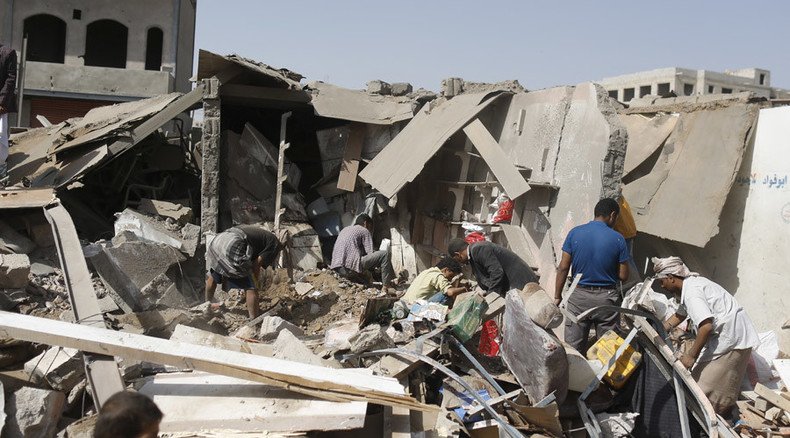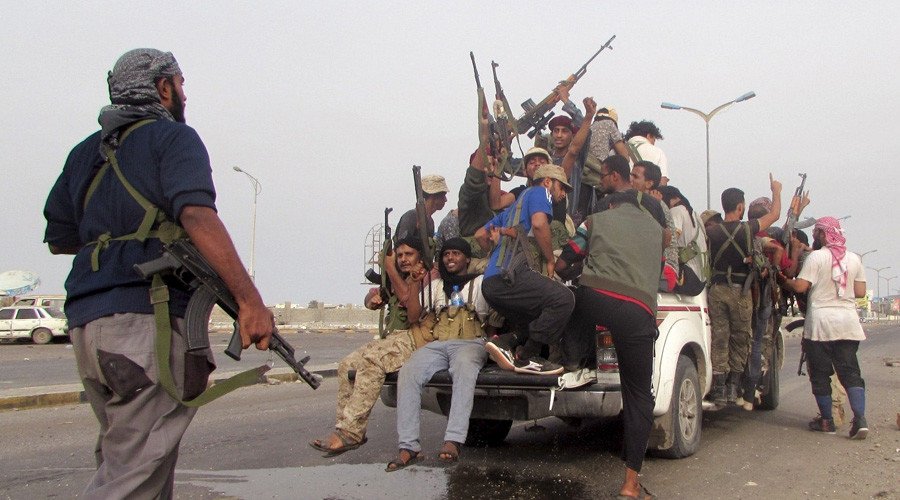The Battle for Aden or the radicalization of Southern Arabia

A country interrupted, Yemen continues to be gripped by war, plunged into the throes of a conflict which could devolve into the invasion of southern Arabia by ISIS armies. What if the Houthis were not the enemy but the resistance?
If from the onset of the war in Yemen back in March 25, Saudi Arabia unilaterally proclaimed its desire to "liberate" the country from the influence of the Houthis, to restore Yemen's political legitimacy in the person of once-resigned-twice-runaway President Abdo Rabbo Mansour Hadi, Al Saud Royals most certainly failed to mention that their real agenda lied in opening up Yemen to a radical takeover.
For those who continue to be under the illusion that this war in Yemen aims to curtail the so-called Shia crescent and thus moderate Iran’s rising influence in the Middle East and most particularly the Arabian Peninsula, make no mistake, war capitalists only seek one thing - plant terror seeds and watch it generate millions of dollars.
For neo-imperialists the world over, there is more money to be made in chaos than in peace. And since instability and extremism have so far played in perfect harmony with America's war-mongering, acting a tidy self-fulfilling prophecy of horrors and bloodshed, while justifying military interventionism, why stop the train at Iraq and Syria?
READ MORE: War on Yemen: Where oil and geopolitics mix
Puppets in the hands of imperial America, Al Saud have too, fallen victim of their own political paranoia, prisoners of the evil upon which they weaved the seat of their powerhouse and regal legitimacy - Wahhabism.
Forced to contend with Wahhabis' rising ambitions King Salman has had to play a dangerous game of give and take to prevent the clergy from turning on his own house.
The ideological fountainhead of what Western powers call "Islamic radicalism,” Wahhabism has become a growing infestation within the kingdom, one calling and longing for a grand sectarian crusade against its self-designated enemy: Shia Islam.
And because Yemen had the gall to reject the Riyadh diktat, preferring instead to join the nascent non-aligned pan-Arab resistance movement, the impoverished nation has found itself in the midst of a furious storm. The Yemen conflict is of course multi-layered and multi-dimensional. Yemen's geography and its natural resources for example have long been the source of much envy and it would be missing a piece of the puzzle to refuse to acknowledge their role within this equation of war.
Beyond the desire to control Yemen's inner riches and transform its territory into yet another base in this grand globalization game, let's not underplay the role of the black plague - ISIS, in furthering this covert agenda.
One look at Saudi Arabia's battle plan in Yemen offers an interesting perspective; one which betrays the kingdom's foremost strategic goals - divide if it cannot conquer.

READ MORE: Saudi Arabia arrests 431 Islamic State suspects, claims to thwart attacks
If one were to assume that Riyadh is indeed intent on crushing the Houthis where they stand, and reintroduce King Salman's political pawn: Hadi; then why concentrate so much firepower in south Yemen, where the group has only limited traction? Why turn Aden, a geopolitical jewel, into one of the main frontlines of this war?
Up until now most experts have argued Saudi Arabia seeks to disrupt any potential Iranian aid toward Yemen, sealing the country's coastline to the outside world to better suffocate the resistance. And though such an analysis is perfectly valid, it leaves out a darker and far more troubling design - the annexation of Yemen by ISIS legions.
Unlike North Yemen which has always resisted Al-Qaeda’s radical views due to its Zaidi heritage, southern Yemen has proven much more receptive to Wahhabism and its sister in terror, Salafism. Within this context, the battle for Aden makes much more sense.
Military sources allied to the Houthis in Aden have already confirmed that an ever-increasing flow of weapons has poured into the city, unchecked and unchallenged because of the fluidity of the conflict. Those weapons, officers from the disbanded Republican Guards have already warned, have gone straight to Al-Qaeda sleeping cells.
Countless pre-war security reports have long established that ahead of the Aden planned takeover radical militants infiltrated Aden and several neighboring provinces, waiting for leadership to ring the hour. And while many assumed the head of the snake to be in Abyan (southern Yemeni province), where Al-Qaeda once claimed its own caliphate (2012); what if all missed the writing on the wall? What if the leadership is indeed sitting in Riyadh, using a Western-sanctioned military intervention in southern Arabia to accomplish what it could not before?
If a report by the Wall Street Journal is anything to go by, Yemen is not just a sitting duck; its borders have already been breached. It reads, "Local militias backed by Saudi Arabia, special forces from the United Arab Emirates and Al-Qaeda militants all fought on the same side this week to wrest back control over most of Yemen’s second city, Aden."
READ MORE: ISIS declares war on Shias on Arabian Peninsula – monitoring group
Is it not legitimate therefore to assume that Al-Qaeda was enrolled by its patron: Saudi Arabia, to sow chaos within and thus contain Yemen's ability to rise a functioning democracy south of Al Saud reactionary theocracy?
Interestingly it was former President Ali Abdullah Saleh who first presented such a hypothesis to his countrymen, arguing Riyadh would claim democracy-building to plot the invasion of Yemen and break its defenses by playing the Al-Qaeda card.
And though most pinned such revelations down to Saleh’s desire to rally support back to his side, the veteran politician undeniably shone a light onto the underbelly of this conflict.
Yemen’s war is not just a conflict of political legitimacies or even natural resources - it is about the subjugation of southern Arabia to the rule of terror.
Let us remember with which fervor Riyadh pounded at Yemen’s military infrastructures over the past months, how it laid waste weapon depots and bases across all provinces, reducing the country’s entire defense capabilities to rubble.
Al Saud aimed not just to crush the Houthis, it ambitions is to open Yemen up to a ground invasion and leave its people defenseless before ISIS hordes - a repeat of Iraq’s debacle.
And if many Yemenis are still under the grand illusion that the Houthis are indeed the enemy, they would do well to learn from the lessons of Iraq and Syria before they find themselves shackled hand and foot by ISIS armies.
As it currently stands, Yemen is all but spent by months of an implacable Saudi-led and Western-organized maritime blockade. With famine looming and social instability at an ultimate high, what resistance will the people of Yemen offer to the black flag should it decide to invade?
The statements, views and opinions expressed in this column are solely those of the author and do not necessarily represent those of RT.
The statements, views and opinions expressed in this column are solely those of the author and do not necessarily represent those of RT.













